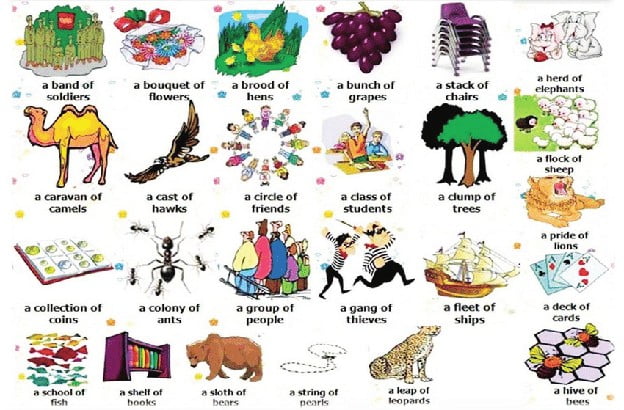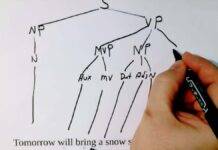A collective noun is a type of noun that refers to a group of people, animals, or things as a single unit. It describes a collection or a whole rather than individuals within the group. Examples include words like “family” for a group of relatives, “team” for a group of athletes working together, and “flock” for a group of birds.
Collective nouns play a vital role in grammar as they determine the verb form that follows them. In most cases, collective nouns are treated as singular nouns, requiring singular verb forms. However, there are instances where the collective noun is seen as a plural noun, necessitating plural verb forms. This distinction depends on the emphasis on the group or the individuals within the group.
Using a collective noun typically depends on whether the speaker sees the group as a single, cohesive unit or as individuals acting in unison or separately. For instance, the collective noun ‘jury’ refers to a group of people making a legal decision. Still, one might also say, “The jury are having difficulty agreeing on a verdict,” acknowledging the individuals within the group. Other examples include ‘class’ (a group of students), ‘choir’ (a group of singers), ‘pack’ (a group of wolves), and ‘bunch’ (a group of grapes or keys).
Collective nouns can be general or specific, ordinary or whimsical. Some, like ‘murder’ for a group of crows, have colourful and historical origins. They are a vital feature of English syntax because they allow linguistic efficiency and variety when describing groups. Using collective nouns in writing is essential because it helps to convey a clear and accurate message to the reader. By correctly identifying and using collective nouns, the writer can indicate whether they are referring to the group as a single entity or to the individuals within it. This helps to avoid confusion and ensures that the verb form and pronouns used in the sentence are grammatically correct.
Types of Collective Nouns
Human Collective Nouns
- a team of athletes
- a crowd of people
Object Collective Nouns
- a collection of books
- a fleet of ships
Animal Collective Nouns
- a herd of elephants
- a pack of wolves
Insect Collective Nouns
- a swarm of bees
- a colony of ants
Bird Collective Nouns
- a flock of birds
- a parliament of owls
Fish Collective Nouns
- a school of fish
- a shoal of salmon
Reptile Collective Nouns
- a bask of crocodiles
- a nest of snakes
Amphibian Collective Nouns
- a knot of toads
- a colony of frogs
Natural Phenomenon Collective Nouns
- a storm of thunder
- a gust of wind
Profession Collective Nouns
- a staff of teachers
- a crew of sailors
Food Collective Nouns
- a bunch of bananas
- a cluster of grapes
Plant Collective Nouns
- a forest of trees
- a field of flowers
Abstract Concept Collective Nouns
- a series of events
- a range of emotions
Common Collective Nouns
This list of common collective nouns contains words that describe groups of animals, people, or things. These words are sometimes interchangeable, and English writers and speakers often use them to describe different things. For example, the word swarm is usually used to discuss a group of insects such as ants, flies or bees, but many writers use it to talk about a bustling crowd of people. Once you are familiar with these words, you’ll notice they are used in various situations.
- Herd– A group of herbivore animals
- Pack– A group of canine animals such as wolves or dogs; also used to describe playing cards and packages containing multiple objects
- Flock– A group of birds; also used to discuss small-hooved animals such as sheep or goats
- Swarm– A group of insects
- Shoal– A group of fish
- Group – A very general term used to describe people, places, things, and animals
- Crowd – Usually used to describe a group of people
- Gang – Usually used to describe a group of criminals; also used to describe a group of workers, particularly sailors or dock workers
- Mob – Normally used to describe an angry or unruly group of people; also used to describe a group of kangaroos
- Staff – A group of people who work in the same place
- Crew – Usually used to denote a group of workers; also used to describe aircraft and ship personnel
- Choir – A large, organized group of singers
- Orchestra – A large, organized group of instrumentalists led by a conductor
- Panel – A group of experts
- Board – A group of people, usually professionals, who take on an advisory role
- Troupe – A group of actors or acrobats; also used to describe a group of monkeys
- Bunch – Usually a group of smallish objects such as grapes, flowers, keys, or bananas
- Pile – An untidy collection of items such as rubbish
- Heap – A mounded collection of items; used interchangeably with “pile”
- Set – A tidy group of matched objects such as dishes; also used to describe rules or a social group of people
- Stack – A group of items neatly laid one on top of another, i.e., a stack of books
- Series – Used to discuss movies, books, or events that follow one after another, i.e. Star Trek or Harry Potter
- Shower – Usually used to describe rain, although it can be used to describe gifts or compliments
- Fall – Often used to discuss weather, such as rain, snow or hail
Formation of Collective Nouns
The formation of collective nouns can vary, but they all refer to a group or collection of things or people.
- Singular form with a plural meaning (e.g., a group of students)
- Plural form with a singular meaning (e.g., the committee is meeting tomorrow)
- Combination of words (e.g., a swarm of bees, a bunch of flowers)
- Derivation from a verb or adjective (e.g., a flock of birds, a pride of lions)
Usage of Collective Nouns
Agreement with Verbs and Pronouns
When using collective nouns, it is important to remember that they can take either singular or plural verbs and pronouns, depending on the context.
E.g., the team is/are practising
A singular verb and pronoun should be used if the group is seen as a single entity. On the other hand, if the focus is on the group’s individual members, a plural verb and pronoun would be more appropriate. This flexibility allows us to accurately convey the dynamics and characteristics of the group while maintaining grammatical correctness.
Determining Singular or Plural Verb Usage
Determining singular or plural verb usage can sometimes be tricky, but it is essential for maintaining grammatical correctness.
E.g., the committee decides/decide
When discussing a committee as a unified entity making a decision, a singular verb like “decides” should be used. However, if the emphasis is on the individual members of the committee and their separate decisions, a plural verb like “decide” would be more appropriate. By carefully considering the context and dynamics of the group, we can accurately convey their actions while following the rules of grammar.
Proper Capitalisation of Collective Nouns
Proper capitalisation of collective nouns is also important in maintaining grammatical correctness.
E.g., the United Nations
It is crucial to capitalise collective nouns when they refer to a specific group or organisation. For example, “the United Nations” should always be capitalised. Adhering to these rules ensures that our writing is clear, accurate, and grammatically correct.
Examples of Collective Nouns in Sentences
- The flock of birds flew south for the winter. – The herd of cattle grazed peacefully in the meadow.
- The team of scientists conducted experiments to test their hypothesis.
- The band of musicians played a lively tune at the concert.
- The committee of experts gathered to discuss potential solutions to the problem.
- The swarm of bees buzzed around the hive, collecting nectar.
- The board of directors is meeting tomorrow.
- A bunch of grapes is sitting on the kitchen counter.
Importance of Using Collective Nouns Properly
Enhances Clarity and Precision in Writing
Using the correct collective noun in writing enhances clarity and precision as it accurately describes a group or collection of individuals. Just like a team of scientists conducting experiments or a committee of experts gathering to discuss potential solutions, using the appropriate collective noun ensures that the readers understand the specific nature and purpose of the group being referred to. In contrast, referring to a bunch of grapes as a team or committee would be incorrect and would not accurately convey the image of a cluster of grapes sitting on the kitchen counter. Therefore, using collective nouns properly is crucial in effectively communicating ideas and maintaining clear and precise writing.
Avoids Confusion or Ambiguity in Communication
Using collective nouns properly helps to avoid confusion or ambiguity in communication. For example, when discussing a group of scientists conducting experiments, using the collective noun “team” would accurately convey the collaborative nature of their work. Similarly, referring to a committee of experts gathering to discuss potential solutions emphasises their collective expertise and purpose. By using the appropriate collective nouns, readers can easily understand the specific nature and purpose of the group being referred to, leading to clear and precise writing.
Reflects a Strong Command of Grammar and Language Skills
A strong command of grammar and language skills is essential to convey information and ideas effectively. By using the appropriate collective nouns, writers can ensure their message is clear and easily understood. Additionally, using collective nouns accurately demonstrates an understanding of the nuances of language and enhances the overall quality of writing. Therefore, mastering collective nouns is crucial to developing strong grammar and language skills.
Collective nouns contribute to the richness of the English language, allowing for precision and brevity in communication. They add a layer of nuance by suggesting a unified identity for a group, emphasising their collective nature rather than individual components.





























